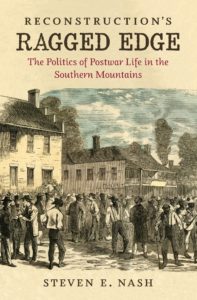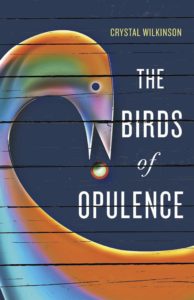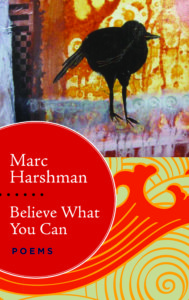The winners of the 2016 Weatherford Awards are Crystal Wilkinson’s The Birds of Opulence (fiction), Marc Harshman’s Believe What You Can (poetry), and Steven E. Nash’s Reconstruction’s Ragged Edge: The Politics of Postwar Life in the Southern Mountains (nonfiction).
The Weatherford Awards honor books that “best illuminate the challenges, personalities, and unique qualities of the Appalachian South.” Granted by Berea College and the Appalachian Studies Association for forty-seven years, the awards commemorate the life and achievements of W.D. Weatherford, Sr., a pioneer and leading figure in Appalachian development, youth work, and race relations, and of his son, Willis D. Weatherford, Jr., who was Berea College’s sixth President (1967-84).
These winning authors will be recognized at the 2017 Appalachian Studies Conference at The Inn at Virginia Tech in Blacksburg, Virginia, March 10, at 6:30.
Nonfiction Award

Steven Nash
In this study titled Reconstruction’s Ragged Edge: The Postwar Life in the Southern Mountains, Steven E. Nash chronicles the history of Reconstruction as it unfolded in the mountains of western North Carolina. Nash examines bitter power struggles between white anti-Confederates who allied with former slaves and a new market-oriented class of elites who claimed legitimacy from the antebellum period. Nash illuminates the diversity and complexity of Appalachian political and economic machinations, while bringing to light issues the era posed to the South and the nation as a whole. The book is published by the University of North Carolina Press.
Steven E. Nash was born in Pittsburgh, Pennsylvania, grew up in Annandale, New Jersey, and currently lives in Weaverville, North Carolina. Nash earned his Ph.D. from the University of Georgia in 2009. He is an assistant professor of history at East Tennessee State University.

Book cover; Reconstruction’s Ragged Edge: The Politics and Postwar Life in the Southern Mountains
Judges said they selected Reconstruction’s Ragged Edge because of “its storytelling quality and for its important historically contextualized perspective. The books fills a gap in scholarship about a much-explored era using previously untold factual and observational anecdotes and analysis. It draws readers into the story and will appeal to a wide readership. It possesses a timeless quality of scholarship that will last.”
Finalists for the 2016 Weatherford Award in nonfiction are Paul J. Adams’ Smoky Jack, Wilma Dykeman’s Family of Earth: A Southern Mountain Childhood, and Appalachia Revisited: New Perspectives on Place, Tradition, and Progress edited by William Schumann and Rebecca Adkins Fletcher.
Fiction Award

Crystal Wilkinson
Set in a small black Appalachian township, Crystal Wilkinson’s lyrical novel The Birds of Opulence explores how several generations of women deal with mental illness and complicated ties to both land and family. The book, which recently received the prestigious Ernest J. Gaines Award, is published by the University Press of Kentucky.
Wilkinson was raised in Indian Creek, Casey County, Kentucky. She holds degrees from Eastern Kentucky University and Spalding University. A founding member of the Affrilachian Poets and author of two short-story collections, Wilkinson has spent her time as a teacher and professor of creative writing at many colleges and universities. At present, she is Appalachian Writer in Residence at Berea College.

AppleMark; Book Cover: The Birds of Opulence
Of The Birds of Opulence, one judge said, “This seems to be the book Wilkinson was born to write. Her voice and this multi-generational narrative—which is both heartwarming and heartbreaking—blend to create a melody that stands out.” Another judge hailed The Birds of Opulence for its “gorgeous language, metaphorical coherence [and] generosity of spirit. Wilkinson’s novel absorbs much sorrow, to be sure, but triumphs over it.”
Finalists for the 2016 Weatherford Award in fiction are Carrie Mullins’ Night Garden and Ron Rash’s The Risen.
Poetry Award

Marc Harshman
West Virginia Poet Laureate Marc Harshman explores the difficulty of living with an awareness of the inevitable death of all living things and methods of coping with that inevitability in his poetry collection Believe What You Can. This collection is published by Vandalia Press, an imprint of West Virginia University Press.
Harshman has lived his adult life in northern West Virginia, though he was raised in Indiana. He holds degrees from Bethany College, Yale University Divinity School, and the University of Pittsburgh. For the first part of his career, Harshman taught fifth and sixth grade, and for the last 20 years he has been a professional writer, storyteller, and workshop leader. Author also of thirteen children’s books, Harshman is the seventh Poet Laureate of West Virginia.

Book cover: Believe What You Can
Of Believe What You Can, one Weatherford judge said they found Harshman’s poetry to be “enduring.” They continued, “His work neither took for granted nor exploited any Appalachian stereotypes. Each poem stood on its own metaphorical and transcending ability alone, relying on no down-home domestic detail to make it relevant or social cause to carry and give it weight. It had no other agenda than to make the invisible visible.” Another said that Harshman’s collection was “a gem of a book, composed of finely tuned sentences that stand in tribute to language and this region.”
Finalists for the 2016 Weatherford Award in poetry are Joseph Bathanti’s The 13th Sunday After Pentecost, Kathleen Driskell’s Blue Etiquette, and Rita Sims Quillen’s The Mad Farmer’s Wife.